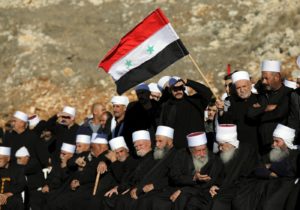Why the US decision about Golan Heights, West Bank and Gaza is dangerous

Druze Arabs on the Israeli-occupied Golan Heights hold an anti-election protest outside a municipal polling station in Majdal Shams
Mohsen Abu Ramadan writes in Middle East Eye:
The US government’s decision to drop the word “occupied” in referring to the Golan Heights, West Bank and Gaza Strip comes as an extension of US policy under President Donald Trump, who has adopted the positions of Israeli Prime Minister Benjamin Netanyahu’s rightwing government entirely.
Last year, Trump moved the US embassy to Jerusalem and recognised the city as the capital of Israel. He froze US aid to the Palestinian refugee agency, UNRWA, and demanded a redefinition of Palestinian refugee status by excluding new generations, which would reduce the number of refugees from more than five million to around 40,000.
Expanding settlements
The Trump administration also decided that the continuous expansion of Israeli settlements was not an obstacle to the peace process, knowing that the US ambassador to Israel, David Friedman, is a major supporter of the settlement enterprise.
In addition, the US closed the Palestine Liberation Organisation office in Washington and froze US aid to Palestinians, estimated, according to OECD data, at nearly $7.3bn from 1993 to 2017.
It did not end there. The US government enacted laws to prohibit providing funds to the families of Palestinian political prisoners and individuals killed by Israel, under the pretext of “fighting terrorism”.
It also considers any form of criticism of Israel to be anti-semitic, including the boycott, divestment and sanctions (BDS) movement, which is a legal and peaceful form of protest.
These developments are part and parcel of how the US assumes it will deal with the Palestinian issue: through the removal of political solutions based on the Palestinian people’s right to self-determination, in accordance with international law and resolutions.
